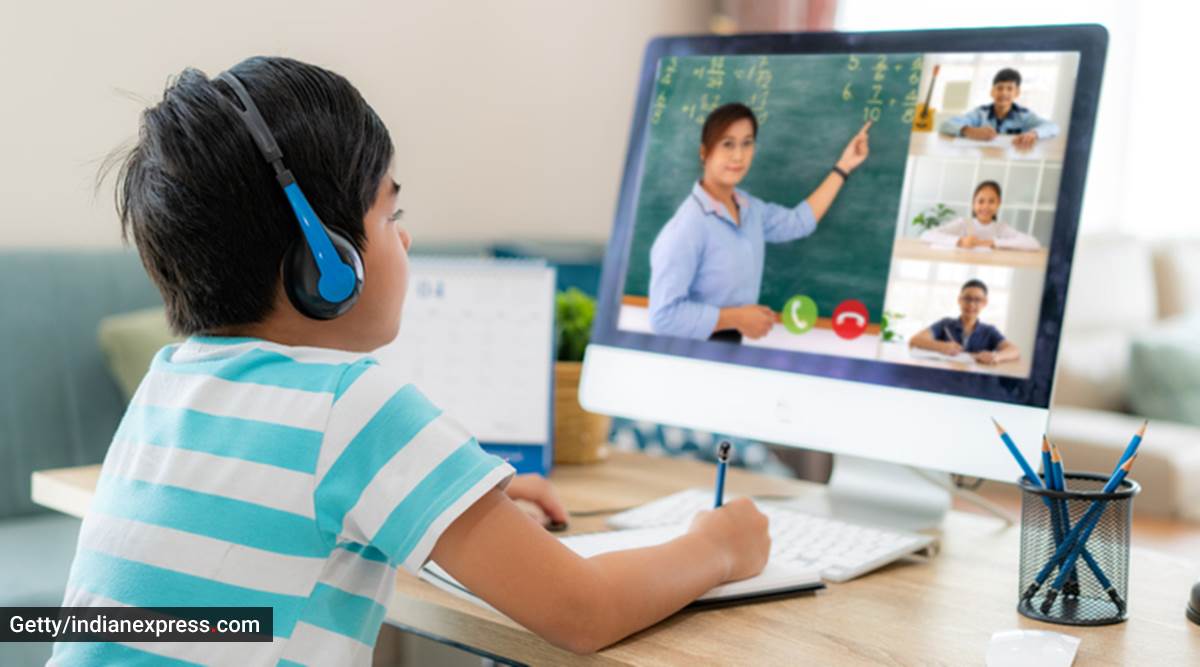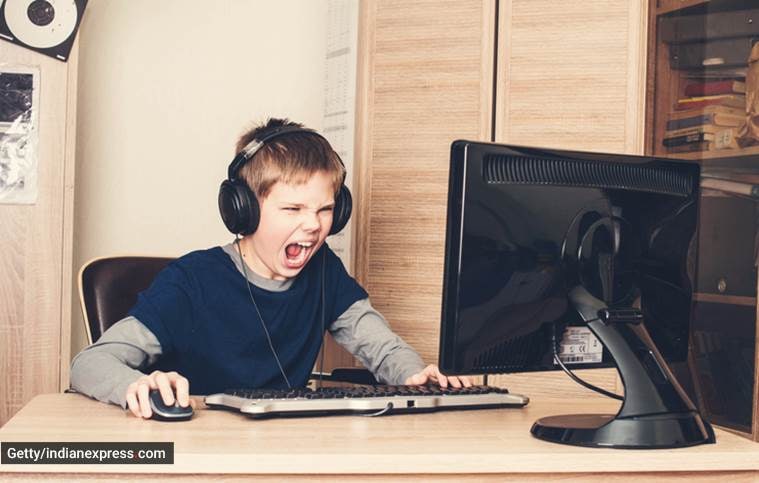Erratic pandemic behaviour in kids: When do schools recommend counselling?
With kids acting out during online classes and displaying behavioural setbacks, it has largely fallen on schools to address the issue, providing them with a conducive learning environment. But, have they been successful?

A 14-year-old, tired of the droning of his teacher’s voice, and the drudgery of online classes, switched to a private window, where he began to play games online with his friends, who joined him from their respective houses.
Elsewhere, a nine-year-old snapped at one of her classmates when she was asked to repeat herself, in the virtual presence of their teacher, much to the dismay of her mother, who was holding her own work meeting in the adjacent room.
Ever since the pandemic started, the numerous lockdowns have only puzzled children, pushing them to embrace a ‘new normal’ while they were barely beginning to make sense of their life. Among other things, the absence of actual physical interactions in schools has made kids irate, impatient. Online classes and long hours in front of a computer screen have worried parents, especially if they have noticed behavioural setbacks in their kids.
As such, it has largely fallen on the schools to address the issue, providing students with a conducive learning environment. But, have they been successful?
Addressing child discomfort and behavioural issues
Allan Andersen, the director of Bengaluru-based Chaman Bhartiya School, says schools need to recognise fact that they are not only here to “impart academic education”, but also to “enable the child to cope with emotional/physical stress”. In his school, social-emotional well-being is incorporated as a part of the curriculum, with each learner having been assigned a mentor. “There are frequent mentor-learner meetings. The learner shares with the mentor the challenges they are encountering — be it academic, personal or emotional. They work together towards solving these challenges. The fact that the child has an adult to turn to is emotionally reassuring. Training the mentors to counsel children is part of our ‘Continual Professional Development’,” he tells indianexpress.com.
At Narayana e-Techno School, Bengaluru, they have “a team of expert child psychologists available to address students’ mental and behavioural health”. The school’s vice principal and mathematics teacher (primary) Jyothi V tells this outlet: “We have developed in-house programs that provide customised therapies, initiatives to promote a positive school atmosphere, skills to cope with bullying and conflicts, healthy peer relationships, and participation in suicide prevention activities, among other things.”
Similarly, at Mumbai’s Aditya Birla World Academy, there is a mental health curriculum, called ‘Minds Matter’, where counsellors interact with students every week “to provide them with tools to enhance their mental well-being”. “We also have initiatives like ‘Happy Place’, ‘Happiness Week’ and ‘Failure Week’, where our students are given a safe space to share their thoughts and feelings,” says Aachal Jain, the school’s pastoral care coordinator.
But despite the availability of all these resources, the fact remains that children have struggled. And that boredom and lack of interest have only been ‘surface issues’.
Acknowledging it, Jyothi says, “Several components required for the healthy development of children have been severely impacted in the pandemic. These include physical activity, interaction with friends, new experiences from travel, unstructured playtime”.
“The lack of these elements in their daily life has certainly affected their mood regulation and the ability to concentrate and learn during online classes… Poor behaviour is frequently the result of a skill deficit in children,” she comments.
The role of teachers
It is usually the teachers who first notice that something is amiss with a child. In Chaman Bhartiya School, they have had one or two instances of kids acting out. “First the teacher addresses the child in a gentle tone. They continue to observe the child and if it emerges as a pattern, parental intervention is initiated. Sometimes, counselling is suggested to enable us to get to the root cause of the problem,” says Andersen.
Jain is of the opinion that “if the classes are engaging and planned with intermittent breaks”, there are not many behavioural concerns. “When teachers notice a shift in the child’s behaviour or interaction, they should make an effort to have a one-on-one conversation with the student. If even after repeated interactions the behaviour persists, a referral to the counsellor can be made.”

The need for counselling and breaking it to parents
It is natural for parents to get concerned when they hear from teachers their child may be acting out in class, and may, therefore, need the intervention of a specialist. How can the news be broken to them?
In The Aditya Birla Integrated School (TABIS), Mumbai, school psychologist Avalanne Dsouza says students “can be referred to a counsellor either by a teacher, school authority, parent, peer or by a student”. “[It generally happens] when a consistent change in behaviour or mood is observed. This may suggest behavioural concerns or emotional disturbances,” she explains, adding that breaking the news to parents “completely depends on the severity of the concerns”.
“But in most cases, parents are made aware of the presenting problem and the counsellor discusses healthy strategies and coping skills they can use at home. If the team does observe the child is at the risk for any mental health concern, parents are immediately notified and are made aware of the various methods of treatment which may include diagnosis, medication and/or therapy,” she tells this outlet.
What counsellors think of children’s erratic pandemic behaviour
Kanchan Rai, mental and emotional well-being coach, and the founder of ‘Let Us Talk’, says “being able to state whether your child is undergoing an emotionally-rough stage, is not always that easy”. “Early identification and appropriate intervention are imperative to effectively deal with the child’s behaviour pattern.”
“Signs of behavioural issues displayed by children include conduct and anxiety issues, mood shifts, sleep issues, persistent sadness, changes displayed in eating patterns, angry outbursts, difficulty in concentrating, withdrawing from social interactions, irritability, experiencing weight loss or gain, drastic changes in academic performance, constant headaches, an urge to hurt oneself or others, unusual behaviour patterns and personality changes. In case your child’s behaviour is not developmentally appropriate, like if your child continues to throw tantrums or indulges in violent activities, it is vital to seek professional help,” she cautions.
Agreeing with her, Dr Himani Narula, developmental paediatrician, adolescent mental health expert, and the co-founder of Continua Kids says she gets to see children of all age groups with developmental and behavioural problems. “Toddlers are coming with significant social and communication delays due to social deprivation. The school-age children are facing challenges in academics and parents have to spend extra time to help them cope. Teenagers are worried about their future. There is an increase in symptoms of stress, anxiety and depression being reported in children and adolescents.”
Dr Narula warns that any child with “symptoms of depression, anxiety or stress in the form of sudden increased irritability, aggression, increasing fear, disturbance in sleep and eating patterns, feeling of hopelessness and worthlessness, self-harm or suicidal thoughts persisting for longer than two weeks” must be reported, and that parents “be guided to seek help from mental health professionals”.
Rai adds that because kids do not always “verbalise their emotional struggles” when they are emotionally hassled, it is “often expressed through physiological changes and alterations in behaviour patterns”. “If the child has been resorting to unusual behaviours even after being counselled, the school authorities must bring it to the notice of parents so that the child can receive timely medical attention,” she concludes.
For more lifestyle news, follow us: Twitter: lifestyle_ie | Facebook: IE Lifestyle | Instagram: ie_lifestyle
Source: Read Full Article



